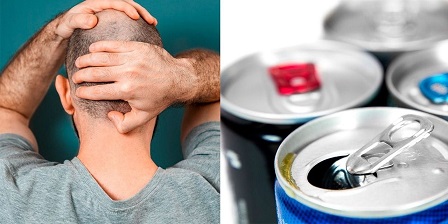Soda Linked to Higher Risk of Male Baldness: Chinese Study Uncovers the Dark Side of Sugar-Sweetened Beverages
Health News - Male Baldness - Sugar Sweetened Beverages Apr 27, 2023 2 years, 9 months, 3 weeks, 5 days, 19 hours, 59 minutes ago
Health News: A groundbreaking study conducted by Chinese nutritional epidemiology investigators has discovered a strong link between the consumption of sugar-sweetened beverages (SSBs) and male pattern hair loss (MPHL) in young men. The study findings have sparked widespread concern and ignited a conversation about the dangers of excessive sugar consumption on hair health.

Principal investigator Dr Ai Zhao, PhD, an assistant professor of public health at Tsinghua University in Beijing, China, observed that many of her friends and colleagues suffering from hair loss had unhealthy eating habits, particularly the overconsumption of sugary drinks. The old Chinese saying, "If you eat too many sweets, your bones will ache and hairs will shed," further piqued her interest in the relationship between sugar and hair loss.
The cross-sectional study, which surveyed 1028 men aged 18 to 45 from 31 provinces in China, found that individuals who consumed SSBs more than seven times a week were 3.36 times more likely to suffer from MPHL. This association remained significant even after accounting for factors such as sociodemographic background, hair status, dietary intake, lifestyle, and psychological status.
One of the primary reasons for the increased SSB consumption among young people is a lack of awareness regarding the adverse effects of these beverages. Dr Zhao believes that apart from health education, various other factors influence people's perceptions of beverage healthfulness, such as the color and transparency of the packaging.
While some studies have focused on the impact of high-fat diets on MPHL, the role of added sugar and sugary drinks has received less attention.
The findings of this study not only contradict previous research but also shed light on several potential mechanisms that could explain the connection between SSBs and hair loss.
The high sugar content in SSBs leads to higher serum glucose concentrations, which triggers the polyol pathway by creating a high affinity for aldose reductase. MPHL, the main type of androgenetic alopecia (AGA), has biochemical symptoms in the scalp that are highly suggestive of an overactive polyol pathway.
Moreover, the study suggests that chronic diseases and anxiety status may act as mediators in the association between sugar drink intake and MPHL. Excessive sugar intake is often accompanied by excessive lipid intake, and a high-fat diet has also been considered a factor in MPHL with past studies and
Health News coverages showing its contributory roles to MPHL.
Interestingly, the study found that tea and coffee, which are rich in caffeine, offer a protective trend against hair loss regardless of whether they contain added sugar, artificial sweeteners, or are unsweetened. This is because caffeine may counteract the negative effects of added sugar.
Although the study provides valuable insights, it is limited by its reliance on self-reported data, making it difficult to establish the temporal and causal relationships between SSB consumption and MPHL.
Dr Arash Mostaghimi, MD, MPH, MPA, an assistant professor of dermatology at Harvard Medical
School, who was not involved in the study, emphasizes that more robust, prospective, and well-controlled trials are needed to draw stronger conclusions.
Treating hair loss is a complex and multifactorial process, and Dr Mostaghimi advises patients to focus on clinically proven treatments such as oral and topical minoxidil and finasteride, rather than resorting to dietary supplements.
This eye-opening study highlights the need for increased awareness among both clinicians and researchers regarding the potential link between SSBs and hair loss. By understanding the biological mechanisms behind this association, we can improve treatment methods and encourage healthier beverage choices for the sake of our hair and overall well-being.
The study findings were published in the peer reviewed journal: Nutrients.
https://www.mdpi.com/2072-6643/15/1/214
For the latest
Health News, keep on logging to Thailand Medical News.
